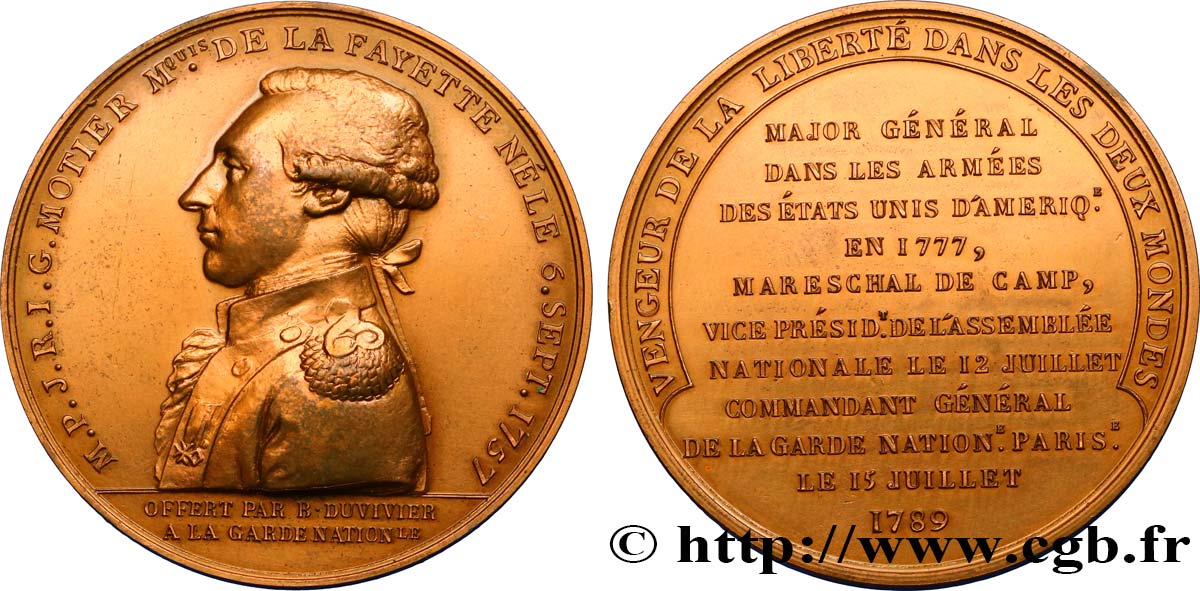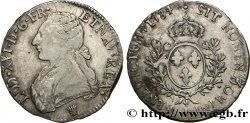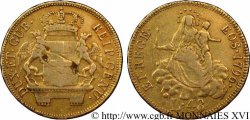fme_413284 - LOUIS XVI Médaille du marquis de La Fayette
Nicht verfügbar.
Artikel auf unserem Online-Shop verkauft (2018)
Preis : 90.00 €
Artikel auf unserem Online-Shop verkauft (2018)
Preis : 90.00 €
Type : Médaille du marquis de La Fayette
Datum: 1977
Name der Münzstätte / Stadt : France
Metall : Bronze
Durchmesser : 42 mm
Stempelstellung : 12 h.
Graveur DUVIVIER Benjamin (1730-1819)
Gewicht : 35 g.
Rand lisse + 1977 corne BRONZE
Kommentare zum Erhaltungszustand:
Intéressant médaille avec une patine homogène
Vorderseite
Titulatur der Vorderseite M. P. J. R. I. G. MOTIER MQUIS DE LA FAYETTE NÉ LE 6 SEPTEMBRE 1757 // OFFERT PAR B. DUVIVIER / A LA GARDE NATIONALE.
Beschreibung Vorderseite Buste à gauche du Larqui de La Fayette.
Rückseite
Titulatur der Rückseite VENGEUR DE LA LIBERTÉ DANS LES DEUX MONDES // MAJOR GÉNÉRAL / DANS LAS ARMÉES / DES ÉTATS UNIS D’AMÉRIQUE / EN 1777, / MARESCHAL DE CAMP, / VICE PRÉSIDENT DE L’ASSEMBLÉE / NATIONALE LE 12 JUILLET / COMMANDANT GÉNÉRAL / DE LA GARDE NATIONALE PARIS / LE 15 JUILLET / 1789.
Beschreibung Rückseite Légende circulaire et en 11 lignes.
Kommentare
Refrappe datée de 1977.
Gilbert du Motier, marquis de La Fayette, dit « La Fayette », né le 6 septembre 1757 au château de Chavaniac, paroisse de Saint-Georges-d'Aurac (province d'Auvergne, actuellement Chavaniac-Lafayette dans la Haute-Loire) et mort le 20 mai 1834 à Paris (ancien 1er arrondissement), est un noble d'orientation libérale, officier et homme politique français. Nommé général par George Washington, Lafayette a joué un rôle décisif aux côtés des Américains dans leur guerre d'indépendance contre le pouvoir colonial britannique et en particulier lors de la victoire de Yorktown le 19 octobre 1781. Lafayette a aussi œuvré à l'émergence en France d'un pouvoir royal moderne, avant de devenir une personnalité de la Révolution française jusqu'à son émigration, son arrestation et sa mise en prison pour cinq ans en 1792. Lafayette fut aussi un acteur politique majeur des débuts de la monarchie de Juillet. Surnommé le « héros des deux mondes », il est l'un des huit citoyens d'honneur des États-Unis d'Amérique.
Après la révolution de 1789, La Fayette décide de signer tous ses courriers d'un « Lafayette » en un seul mot, en réaction contre le système nobiliaire. C'est aussi la graphie utilisée par ses contemporains jusqu'à sa mort..
Re-strike dated 1977.
Gilbert du Motier, Marquis de La Fayette, known as \\\"La Fayette\\\", born on September 6, 1757 at the Château de Chavaniac, parish of Saint-Georges-d'Aurac (province of Auvergne, currently Chavaniac-Lafayette in Haute-Loire) and died on May 20, 1834 in Paris (former 1st arrondissement), was a nobleman of liberal orientation, officer and French politician. Appointed general by George Washington, Lafayette played a decisive role alongside the Americans in their war of independence against the British colonial power and in particular during the victory at Yorktown on October 19, 1781.. Lafayette also worked towards the emergence of a modern royal power in France, before becoming a figure of the French Revolution until his emigration, arrest and imprisonment for five years in 1792.. Lafayette was also a major political player in the early days of the July Monarchy.. Nicknamed the \\\"hero of two worlds,\\\" he is one of eight honorary citizens of the United States of America..
After the revolution of 1789, Lafayette decided to sign all his letters with a single word \\\"Lafayette\\\", in reaction against the nobility system.. This is also the spelling used by his contemporaries until his death..
Gilbert du Motier, marquis de La Fayette, dit « La Fayette », né le 6 septembre 1757 au château de Chavaniac, paroisse de Saint-Georges-d'Aurac (province d'Auvergne, actuellement Chavaniac-Lafayette dans la Haute-Loire) et mort le 20 mai 1834 à Paris (ancien 1er arrondissement), est un noble d'orientation libérale, officier et homme politique français. Nommé général par George Washington, Lafayette a joué un rôle décisif aux côtés des Américains dans leur guerre d'indépendance contre le pouvoir colonial britannique et en particulier lors de la victoire de Yorktown le 19 octobre 1781. Lafayette a aussi œuvré à l'émergence en France d'un pouvoir royal moderne, avant de devenir une personnalité de la Révolution française jusqu'à son émigration, son arrestation et sa mise en prison pour cinq ans en 1792. Lafayette fut aussi un acteur politique majeur des débuts de la monarchie de Juillet. Surnommé le « héros des deux mondes », il est l'un des huit citoyens d'honneur des États-Unis d'Amérique.
Après la révolution de 1789, La Fayette décide de signer tous ses courriers d'un « Lafayette » en un seul mot, en réaction contre le système nobiliaire. C'est aussi la graphie utilisée par ses contemporains jusqu'à sa mort..
Re-strike dated 1977.
Gilbert du Motier, Marquis de La Fayette, known as \\\"La Fayette\\\", born on September 6, 1757 at the Château de Chavaniac, parish of Saint-Georges-d'Aurac (province of Auvergne, currently Chavaniac-Lafayette in Haute-Loire) and died on May 20, 1834 in Paris (former 1st arrondissement), was a nobleman of liberal orientation, officer and French politician. Appointed general by George Washington, Lafayette played a decisive role alongside the Americans in their war of independence against the British colonial power and in particular during the victory at Yorktown on October 19, 1781.. Lafayette also worked towards the emergence of a modern royal power in France, before becoming a figure of the French Revolution until his emigration, arrest and imprisonment for five years in 1792.. Lafayette was also a major political player in the early days of the July Monarchy.. Nicknamed the \\\"hero of two worlds,\\\" he is one of eight honorary citizens of the United States of America..
After the revolution of 1789, Lafayette decided to sign all his letters with a single word \\\"Lafayette\\\", in reaction against the nobility system.. This is also the spelling used by his contemporaries until his death..








 Berichten über einen Fehler
Berichten über einen Fehler Die Seite drucken
Die Seite drucken Teilen meiner Auswahl
Teilen meiner Auswahl Stellen Sie eine Frage
Stellen Sie eine Frage Einlieferung/Verkauf
Einlieferung/Verkauf
 Details
Details















